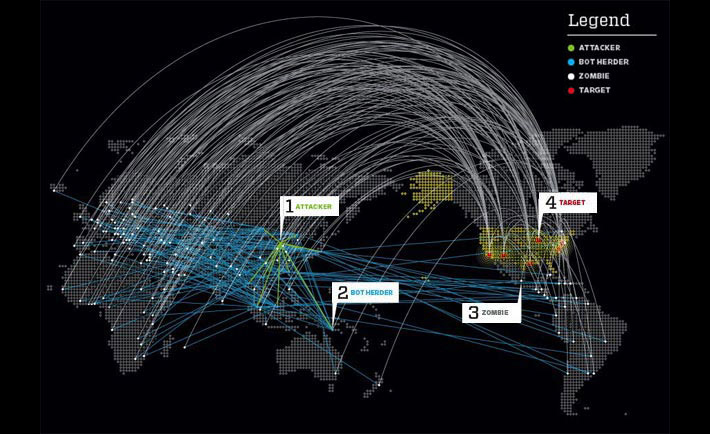A distributed denial of service or DDoS attack can make a website or an entire network unavailable to users for hours, days or even longer. This type of attack is accomplished by groups who overwhelm a website with data or requests until it slows down or crashes completely.
Denial of service attacks have been increasing in the past few years as the hackers involved in this have perfected their skills in knocking people offline. Attacks grew by 70 percent in the first half of 2012 and have even been used against large corporations and government agencies. The increase in DDoS has many worried that they too will become a target for these kinds of attacks.
Denial Of Service
Those who engage in denial of service attacks are very skilled at shutting down their targets using botnets. A botnet is a network of hundreds or thousands of infected PCs that the attacker controls which can flood a website with requests.
The numerous requests end up cutting off access to the site and the user is no longer able to connect to their website. Botnets can even be hired out solely for the purpose of denial of service attacks. People can also volunteer their own PCs to be used in an attack.
Impact Of A DDoS Attack
The impact of a DDoS attack can be catastrophic for organizations that lose access to their sites and cannot communicate or process transactions for days. Many businesses must suffer significant financial losses from losing access to their site as a result of these attacks even if they are only offline for one day.
Some attackers target bigger organizations but almost any company or website can be vulnerable to a DDoS attack. There are more than 7,ooo attacks daily but this number is still on the rise as they are growing more rapidly than ever before.
A Growing Trend
The trend with the growing number of DDoS attacks seems to be shorter attack duration but bigger packet-per-second attack volume. The average attack bandwidth has increased by more than a hundred percent in the past few years. The increase in the number and size of the attacks has many companies alarmed about what could happen if they are targeted for an attack.
It appears that many of the attacks are motivated by political or ideological conflicts. Those involved can often implement an attack because they disagree with an organization’s policies. There are many other types of attacks, however, and it hard to say whether anyone is safe from this growing problem.
The Targets Of Service Attacks
As more people become the targets of denial of service attacks it is a growing concern for those who stand to lose a lot of money from being forced offline. In order to prevent these types of attacks from occurring, people need to seek better security for their companies and be more aware of their vulnerabilities.
Anyone can be a target for a DDoS and it is important to be more cautious about the possibility of attack so as to prevent it from happening at all costs.
Our Guest Blogger, Leo Hart, has a passion for cloud computing from his time spent with Custom Cloud where he helps businesses setup customized virtual servers http://www.customcloudhost.com.


